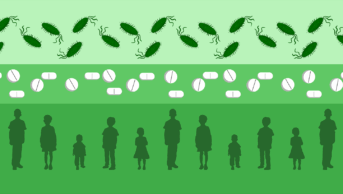
Courtesy, Sandra Gidley
The Royal Pharmaceutical Society (RPS) has expressed ‘serious concerns’ over proposals that could see more than 3,000 commonly prescribed products for conditions including thrush, head lice, constipation and athlete’s foot, effectively removed from prescription in primary care.
The NHS England Board approved plans on 21 July 2017 to consider “recommending not to routinely prescribe” 3,200 products, which can be bought over the counter, and include treatments for acne, warts, and cold sores. The proposal could save the NHS up to £100m a year.
NHS England also wants to stop the routine prescribing of 18 products that are considered to be “relatively ineffective, unnecessary, inappropriate or unsafe for prescription on the NHS”, and which cost the NHS £141m each year. These include oxycodone and naloxone, glucosamine and chondroitin, and doxazosin modified release.
The RPS has said it welcomes the consultation but rejects any proposed restriction on prescribing clinically effective medicines to treat common conditions because it would “fundamentally alter the principle that [NHS] care is free at the point of delivery”. The RPS said that any such changes should be legislated for by Parliament, not implemented by clinical commissioning groups (CCGs).
Chair of the RPS England Board, Sandra Gidley, said people with minor health problems should be encouraged to self-care, with the support of a pharmacist, and expected to buy medicines where appropriate and affordable.
“However, expecting everyone to pay for medicines for common conditions will further increase health inequalities and worsen the health of patients who cannot afford them,” she said.
Blanket ban won’t improve outcomes
“A blanket ban on prescribing of items available to buy will not improve individual quality of life or health outcomes in England.
“Those on low incomes will be disproportionately affected. They should not be denied treatment because of an inability to pay. Longer term costs to the taxpayer of increased ill-health, subsequent GP consultations or visits to A&E must also be taken into account as a result of medicines not having been prescribed.”
The prescribing proposals first appeared as part of NHS England’s Next Steps document, published in March, and they were then approved by the NHS England Commissioning Committee.
If these proposals are implemented they will form statutory guidance, which CCGs must take note of, but do not have to follow.
NHS England national medical director, Sir Bruce Keogh, said any savings from the proposals would be used to fund other services to “beef up the therapeutic muscle of the NHS”.
Homeopathy items are included among the 18 products that could be removed from routine prescribing lists, and NHS England has also said it will “explore including a ban on reimbursing homeopathic treatments in the NHS Standard Contract”.
The RPS said: “Removing homeopathy, which has no scientific or pharmacological basis, from NHS supply is long overdue.”
The consultation will close in October.


